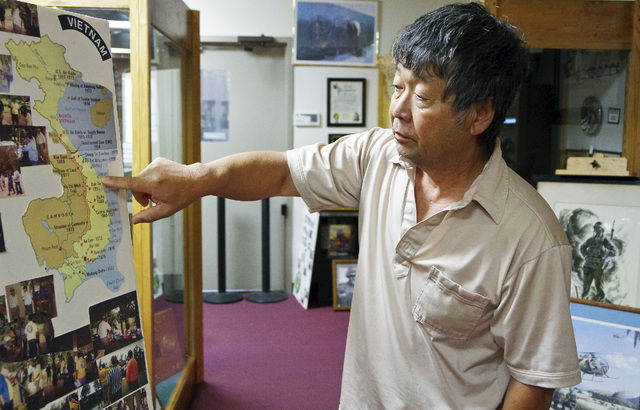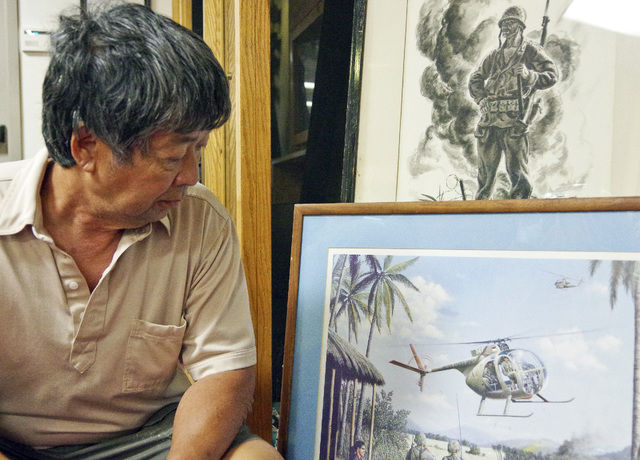LIHUE — Things have changed since the Vietnam War, said Harry Shigekane. “Now, when I tell people I am a Vietnam vet, the standard response is ‘Thank you for your service,’” the Waimea man said. “That means a lot to
LIHUE — Things have changed since the Vietnam War, said Harry Shigekane.
“Now, when I tell people I am a Vietnam vet, the standard response is ‘Thank you for your service,’” the Waimea man said. “That means a lot to me.”
Things were not always like that.
“The bad thing about Vietnam,” Shigekane said, “number one — this was a war we failed to win, and number 2 — the veterans didn’t come home as conquering heroes. They were forgotten.”
Shigekane is not forgotten. He was selected as the grand marshal of the Veterans Day parade Nov. 7 in Lihue.
He said we need to take care of veterans.
“In the United States, as rich as we are, we gotta take care of the veterans,” he said. “There are a lot of homeless veterans. There are lots of veterans who cannot find jobs. There are a lot of veterans because of what they went through — you don’t go through the jungle shooting people and come out rosy.”
Shigekane received the Distinguished Flying Cross with Oak Leaf Cluster for his actions while serving as commander of a UH-1H helicopter with Co. B, 123d Aviation Battalion in Chu Lai just south of Danang near the DeMilitarized Zone on March 13, 1971.
The medal is awarded for “heroism or extraordinary achievement” while participating in an aerial flight.
Involved in a recovery mission of the crew of a downed UH-1H helicopter near Quang Ngai City, Shigekane volunteered to attempt the extraction of the crew which was receiving intense enemy small arms and mortar fire.
The hostile fire was so intense, he was forced to abort the mission on his first attempt. Re-entering the area, Shigekane directed suppressive fire onto the enemy positions enabling him to make a successful extraction and being instrumental in the subsequent defeat of the enemy.
“This was everyday stuff,” Shigekane said. “At the time, we never thought about it. I was 21 years old, and we never had time to be afraid — we were invincible.”
He sees things differently today.
“Now, when you think about it, we were really stupid,” he said. “We didn’t volunteer to go there. Everyone got drafted, or joined because they were going to be drafted. The bad thing was the student deferrment — the rich kids could stay in school, forever. There were quite a few Americans who moved to Canada to avoid the draft.”
The survival rate for helicopter pilots in Vietnam was small, Shigekane said.
“We lost lots of pilots over there,” he said. “It was like that for helicopters because the aircraft was so big and we flew at treetop level — a lot lower than the jets. A helicopter pilot just needed a high school diploma — you graduate at 18 years old, spend a year in flight school, and at 19 years old, it’s possible to be a helicopter pilot.”
Shigekane joined the Army right out of school.
“Invincible,” he said. “They taught you that in military school. We learned about Russian propaganda while we were in school — we were better. They had us raring to go, and there were students who were disappointed because they couldn’t go to Vietnam. I went to school to become an X-ray technician, and when I got out, I found out they were sending nurses in as second lieutenants. But an X-ray tech was only a private. I signed up because you could choose — if you were drafted, you didn’t have a choice. They taught me a trade and I did well at it.”
When he got out of the armed services, Shigekane worked for 25 years as a helicopter pilot, starting as a crop duster before eventually opening his own tour company, Menehune Helicopter.
He also started Kauai Cinnamon at the Kukui Grove Center. His dappling in the culinary arts continued as he started Kino’s Burgers when the Poipu Shopping Village opened, and he is working to open a restaurant in the Rice Shopping Center. He also operates a charter boat company.
“It took us 40 years to figure out war is wrong,” Shigekane said. “At the time, I was there because I had to be there. I am lucky because after the war, I never had to work for anyone. Suffering from post-traumatic stress disorder, I couldn’t sleep. I kept getting up, and if I was working for someone, I would never have made it.”
.



